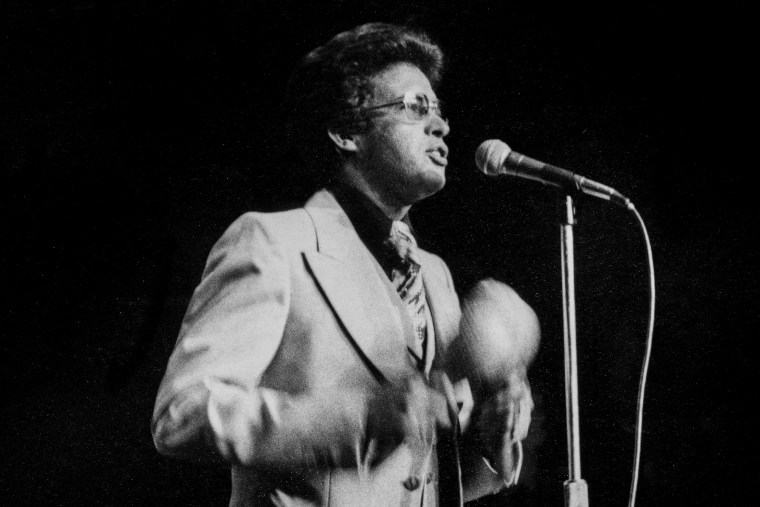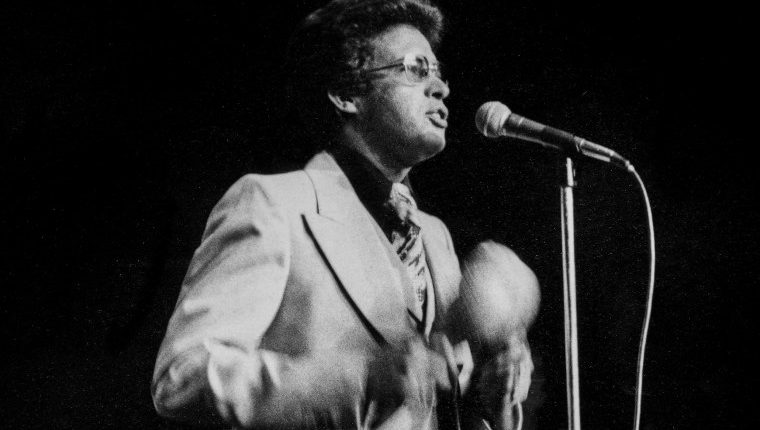Hits by two late Latin music icons whose ballads and salsa songs are constants in playlists across generations have been inducted into the National Recording Registry at the Library of Congress.
Juan Gabriel’s “Amor Eterno” (“Eternal Love”) and Héctor Lavoe’s “El Cantante” (“The Singer”) are among the 25 recordings and albums selected Tuesday for preservation at the nation’s audio history library.
Released in 1990, Gabriel wrote the heart-rending ballad “Amor Eterno” in memory of his deceased mother. The song has since become a staple for many Latino families, touching the hearts of one and all — young, old, working class, upper class, urban and rural.
Regarded as “El Divo de Juárez,” Gabriel began his career in Mexico in the 1970s and rose to stardom in the 1990s. He died in 2016 at age 66.
The iconic Mexican singing-songwriting superstar is known for his fierce and forceful delivery, making audiences want to sing every one of his songs from the top of their lungs, as well as his sweet voice effectively pulling at everyone’s heartstrings.
For many in LGBTQ communities, Gabriel’s flashy onstage personality and exuberant sense of style helped break down social norms, strict gender roles and machismo.
Iván Gabriel Aguilera, the singer’s son, said his father always wanted future generations to relate to his music.
“He would always say that ‘as long as the public, the people, keep singing my music, Juan Gabriel will never die,'” Aguilera said in Spanish. “It’s nice to see that is happening here.”
“He’s going to be immortalized there in the Library of Congress,” Aguilera added.
As Gabriel was jumpstarting his career in Mexico in the 1970s, Lavoe had established himself as one of the greatest salsa music performers in New York City, later becoming known by salsa lovers everywhere as one of the genre’s greats.

Released in 1978, “El Cantante” not only became Lavoe’s signature song: It also became emblematic of the new era of salsa music being ushered in by Fania Records.
Written and produced by fellow Fania Records alums and salsa icons Rubén Blades and Willie Colón, “El Cantante” narrates the livelihood, struggles and adversities singers face. It also describes how they must interact positively with the audience when oftentimes they are their only supporters.
Born in Puerto Rico and raised in the mainland U.S., Lavoe worked as a singer and trombonist with fellow Fania Records great Johnny Pacheco and his orchestra. He joined forces with Colón in 1966, creating one of the most important salsa bands that helped reshape the Latin music industry at the time. One of their hits, “Mi Gente” (“My People”), written by Pacheco, is regarded today by many Latinos as an anthem of Hispanic pride.
Lavoe died in 1993 at age 46.
Both “Amor Eterno” and “El Cantante” are among the dozens of Latin songs nominated to be added to the registry by Rep. Joaquin Castro, D-Texas, and the Congressional Hispanic Caucus as part of a larger effort to increase the recognition of Latino contributions to American history and culture.
Every year for the past 18 years, the Library of Congress has selected 25 recordings for preservation at the National Recording Registry, with works by Latino musicians currently representing less than 5% of inducted titles, according to Castro’s office.
Castro has received hundreds of suggestions from the public for congressional nominations to the National Recording Registry over the past two years, submitting nearly 70 titles of Latin songs for consideration, including Gabriel’s “Amor Eterno” and Lavoe’s “El Cantante” as well as Irene Cara’s “Flashdance…What a Feeling” and Daddy Yankee’s “Gasolina,” which were inducted last year.
All of these songs have helped bring the number of titles on the registry to 650, representing a small portion of the national library’s vast recorded sound collection of nearly 4 million items, according to the Library of Congress.
For more from NBC Latino, sign up for our weekly newsletter.
Source: | This article originally belongs to Nbcnews.com










